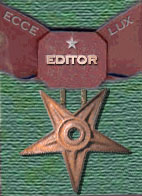User:Tom Reedy
| 24 December 2024 |
|
If you contact me on my talk page, I will answer there. If I contact you on yours, please answer me there.

| This user has created on Wikipedia. |
| This user resists the POV pushing of lunatic charlatans. |
| This editor won the Million Award for bringing William Shakespeare to Featured Article status. |








Indolence
[edit]A REMINDER
[edit]Nishidani and Tom Reedy, I appreciate that you might be dealing with a form of editing that frustrates the best of editors, but you need to stop drawing this sort of attention to yourselves. If an editor is repeatedly trying to push POV, edit tendentiously, etc., it is under one condition that you may try to deal with this by yourselves: that your conduct stays well above par. For most editors, this is close to impossible, and that is why Wikipedians are expected to utilize dispute resolution in order to deal with the problem. Most people either don't quite understand how it works or just don't have the patience because it "doesn't rise to the level of genuine scholarly discussion", but that excuse does not help your cause, even if this does one day end up in front of an ArbCom. If an editor is trying to push POV, open an article RfC - let others see why or how another editor's proposal/editing is problematic. If they can see what you see, and the editing is continuing, then open a user conduct RfC citing the most pertinent examples of the editing. Others will comment on the conduct to the point that the editor hopefully addresses his/her approach. If he/she doesn't, then you bring the matter to ANI where we can remove that editing from that part of the project, or if all else fails, there is the nuclear option of ArbCom. To cut the long story short, if you aren't ready to keep your conduct well above par and you aren't ready to utilize dispute resolution, you will soon find that this project might not be the place for you. You need to make a choice about how others will receive your contributions - this includes in the level of professionalism that others can see in your commentary and edit-summaries. Ncmvocalist (talk) 05:07, 20 May 2010 (UTC)
Scholarship
[edit]Scholarship implies an attitude toward truth and a method of working toward the establishment of truth—whether of historical events or of the meaning and significance of a literary work or of the nature of the world about us. The scholar has no axes to grind. He is not eager to prove his own hypotheses correct, but rather to find out whether they are correct or not. He is ever ready to reevaluate and reinterpret his evidence and to discard one hypothesis in favor of a better. When he uncovers a fact which does not square with his hypothesis he neither shuts his eyes to it nor tries to explain it away nor trims it to fit his own preconceptions, but rather adjusts the hypothesis to fit the facts. The ability to evaluate and reevaluate evidence in any field comes with training and experience in that field. In the field of literary history, as in others, the scholar attempts to construct the whole picture. Familiarity with many points of view enables him to determine which of his predecessors and fellow workers can in general be relied upon for sound scholarship, though even in such reliance he will always test and question. He is humble in attempting to solve problems that have baffled many before him and slow to announce discoveries that will upset well established beliefs. He will familiarize himself with all tools and methods in his field and know which are sound and applicable to the work of the moment. In presenting the results of his research he will distinguish carefully between demonstrable fact and tentative conjecture, never building on the latter, and by full and sound documentation will furnish the reader with the means of testing both conjecture and stated fact. And finally in publishing he will scrupulously check all quotations and references.
Giles Dawson, 1952
This portrait of idealized restraint is admirable, though only because we may intuit idealized restraint as its own ulterior motive, its own worthy axe to grind. Another key element in scholarship, even in historical work, and certainly in all forms of research and knowledge and principle and theory extension, is originality, a bane in Wikipedia's anxious world of many erstwhile editors. Even the most dryly historical of scholars, if considered noteworthy or canonical by virtue of their fairness combined with comprehensive review, are esteemed so because of the addition of the 3rd quality of vision, something which is endemic to all expression (scientific, artistic, or otherwise), review, comprehension, and editing too. 'Whole pictures,' as Dawson asks of literary historians, being so different from one another; and were we to study the phenomena in the lifetime career of such a historian, perhaps amounting to several dozen per brain over time. As the Avon Bard happily demonstrates, to the betterment of the world. Cheers to the scrupulousness which is your wish to us all, Tom Reedy! Pandelver (talk) 02:18, 5 March 2011 (UTC)
Articles I want to work on in the future
[edit]Shakespeare attribution studies
Chronology of Shakespeare's plays
Simon Forman (start new article on Book of Plays)
William Strachey source: [1], The English wits : literature and sociability in early modern England / Michelle O'Callaghan. PR428.W5 O23 2007
Payroll stubs
[edit]| The Copyeditor's Barnstar | ||
| I commend you for all of your hard work on William Shakespeare. To compose and copy edit articles with multitudes of other people is never easy. You have helped produce a fascinating and eminently readable article. Think how many high school essays will reflect your language! :) Awadewit | talk 04:53, 12 August 2007 (UTC) |
| On 28 October 2010, Did you know? was updated with a fact from the article List of Shakespeare authorship candidates, which you created or substantially expanded. You are welcome to check how many hits the article got while on the front page (here's how, quick check ) and add it to DYKSTATS if it got over 5,000. If you know of another interesting fact from a recently created article, then please suggest it on the Did you know? talk page. |

|
The Defender of the Wiki Barnstar | |
| For tirelessly defending Will of Stratford from his nitpickers! (I am in the giving vein today) Buchraeumer (talk) 17:29, 23 December 2010 (UTC) |
Hello! This is a note to let the main editors of this article know that it will be appearing as the main page featured article on April 23, 2011. You can view the TFA blurb at Wikipedia:Today's featured article/April 23, 2011. If you think it is necessary to change the main date, you can request it with the featured article director, Raul654 (talk · contribs). If the previous blurb needs tweaking, you might change it—following the instructions of the suggested formatting. If this article needs any attention or maintenance, it would be preferable if that could be done before its appearance on the Main Page so Wikipedia doesn't look bad. :D Thanks! Tbhotch* ۩ ۞ 02:42, 19 April 2011 (UTC)
The Shakespeare authorship question is the argument that someone other than William Shakespeare of Stratford-upon-Avon wrote the works traditionally attributed to him. Proponents (called "anti-Stratfordians") say that Shakespeare was a front to shield the identity of the real author or authors, who for some reason did not want or could not accept public credit. Although the idea has attracted much public interest, all but a few Shakespeare scholars and literary historians consider it a fringe belief, and for the most part disregard it except to rebut or disparage the claims. Despite the scholarly consensus, the controversy has spawned a vast body of literature, and more than 70 authorship candidates have been proposed, including Francis Bacon, the 6th Earl of Derby, Christopher Marlowe, and the 17th Earl of Oxford. In 2010 James S. Shapiro surveyed the topic in Contested Will: Who Wrote Shakespeare?, in which he criticised academia for ignoring the topic and effectively surrendering the field to anti-Stratfordians, marking the first time a recognised Shakespeare scholar has devoted a book to the topic. Filmmaker Roland Emmerich's next movie, Anonymous, starring Rhys Ifans and Vanessa Redgrave, portrays Oxford as the real author. (more...)

|
The Literary Barnstar | |
| While the Foolhardy Award was briefly considered, this Literary Barnstar was chosen to acknowledge your excellent and tireless work in elevating Shakespeare authorship question from quagmire to FA, and on to the Main Page! Thanks for enriching Wikipedia and its readers. Johnuniq (talk) 00:00, 23 April 2011 (UTC) |


